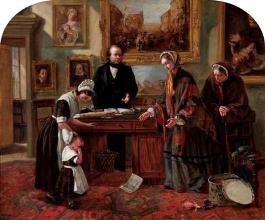I recently ran across Orphans of Empire by Helen Berry, a new nonfiction book chronicling the history of the London Foundling Hospital, Britain’s first home for abandoned children, a find that thrilled me to no end because a) lifeline Anglophile b) lifelong history geek and c) the LFH is the principal setting for my late Regency romance, Claimed By the Rogue.

The LFH was founded by sea captain Thomas Coram, a childless widower with a hefty purse and the heart to match it. Appalled by the 1,000 children abandoned to the London streets each year, Captain Coram resolved to put his money where his morals were. In 1735 he petitioned Britain’s King George II to establish a “hospital” (a philanthropic institution dispensing hospitality) for the education and maintenance of foundlings. Twenty-one aristocratic ladies signed on to Coram’s petition, which quickly picked up steam as a fashionable philanthropy. Coram received his Royal Charter in 1739; the first children were admitted in 1741. Prominent patrons included the painter, William Hogarth and composer George Frideric Handel; the latter served as the hospital’s first governor.
The LFH no longer exists – the gracious Georgian brickwork building in Bloomsbury was demolished in 1926 and the institution ended in the 1950s – but its 200+ year history is preserved in the Foundling Museum in Brunswick Square. Perhaps the most feeling artifacts on exhibit are also the humblest: the museum’s collection of Foundling Tokens – buttons, jewelry, coins etc. – left behind by the mothers, a last tangible link to the child they hoped one day to reclaim. Sadly, such hoped for reunions were rare; the vast majority of tokens remain with the museum.

If an orphanage sounds like an unconventional setting for a Regency romance, you would be right! In Claimed By The Rogue, my heroine, Lady Phoebe Tremont, volunteers at the LFH after her fiance, Captain Robert Bellamy, is presumed lost at sea. Six years later, Robert returns to find a very different Phoebe than the sweet, pampered miss he left behind. Fiercely devoted to the foundlings under her care, determined to continue in her duties despite her impending marriage to an expat French aristocrat, Phoebe is very much a woman ahead of her time. To win her back, Robert makes an offer not even Phoebe can refuse. He’ll donate 100 pounds a day to the institution she lives and breathes provided Phoebe allows him to shadow her in her daily duties.
Spoiler Alert! He falls head over feet for the new impassioned, socially-minded Phoebe – it IS a romance – as well as the adorable orphans under her care.
Enjoy this short excerpt from Claimed By The Rogue and join me on Twitter @hopetarr and Instagram @hopectarr where I post fun historical tidbits at #HistoryMatters.
“Don’t you ever rest?” Robert asked, trailing Phoebe down yet another labyrinthine passageway. So far they’d visited the governors’ court room, chapel, girls’ dormitory, boys’ dormitory, sundry classrooms, and even the morgue, all of it at a brisk to breakneck pace.
She glanced back at him over her shoulder. “I haven’t the need, but don’t let me hinder you from doing so.”
“No, I’m fine. I was only concerned for you.”
“Hmm,” was all she said before darting down yet another white-walled corridor.
Lengthening his stride, he found himself wondering how it was that such a graceful woman managed to move so swiftly. The indolent maid of his memory seemed to have acquired the gait of a racehorse, not that he considered complaining of it. Admiring the hind view of those slender, swaying hips made for a deucedly pleasant pastime even if the reek of turpentine and lemon oil was beginning to block his nose.
The ended their tour at the infirmary. The strong smell of vinegar permeated the vicinity. A glass-front apothecary cabinet containing myriad meticulously labeled clear jars, a washing bench outfitted with a bandage roller and stacked bedpans and a leather bound ledger presumably for recording the circumstances of patients comprised the long, narrow room. Phoebe’s hushed conference with the attending nurse secured their admission. Robert followed her along the queue of narrow cots, all but one of them unoccupied.
“Feeling a bit better today, Sally?” Phoebe asked, pausing to rest her hand upon the child’s brow, her swollen jaw banded by a camphorous cloth.
The girl, Sally, shook her head, wincing. “Tooth hurts terrible.”
Phoebe stroked a hank of brown hair back from the girl’s forehead. “I’m sure it does, poppet, but at least your fever’s down. Once the foulness finishes draining, you’ll be right as rain.”
Dull eyes looked up into hers. “Yes, miss.”
Most in Phoebe’s position would have moved along but instead she lingered. “I was going to give this to you later but now shall serve.” She reached into her gown’s pocket and pulled out a cloth-covered doll.
The fevered little face lit. “Oh, miss, thank you!”
Phoebe tucked the doll into the crook of Sally’s arm and straightened. “Not only a doll but a magic doll. Whenever your tooth troubles you, squeeze upon her and she’ll help keep the pain away.”
Looking on, Robert felt a powerful pull in the vicinity of his heart. Phoebe had the makings of a marvelous mother. The earlier scene in the classroom and now this strengthened his resolve to do all in his power to ensure that her future children would be his, not Bouchart’s.
Seeing her about to turn back to him, he quickly made a mask of his face. “You needn’t fear infection,” she said archly, misreading him yet again. “Mostly we treat minor injuries, sprained ankles and, in Sally’s case, toothache. More serious cases are transported to St. George’s.”
“My constitution is that of an ox,” he answered, no idle boast. Given the fevers and pestilence to which he’d been exposed, an abscessed tooth and a few running noses hardly seemed of note. Stepping away from the beds with Phoebe, he asked, “How did you come to volunteer here?”
She hesitated. “In an odd way, I have you to thank for it.”
“I?” Even strongly suspecting he would regret it, he had to ask, “How so?”
“After we were told you were…lost, I wasn’t entirely certain what to do with myself, how to go on. Coming here began as a crutch, a reason to rise from bed each morning. Over time I began adding days, heartened that it was in my power to do some good.”
His kitchen conversation with Chelsea came back to him. She draped herself in black crepe and bombazine for a full year as though she were your widow in truth. There were times we feared she might take her own life.
“How does your mother feel about your laboring?”
She lanced him a look. “You mean my eccentricity, or so Mother calls it. She’s pinning her hopes on marriage proving the cure. To be fair, I should admit that she is hardly alone in her censure. Barring Chelsea and Anthony, most members of the ton think I’m daft to spend my days fraternizing with orphaned children, whom they’re convinced will amount to nothing more than cutpurses and prostitutes.
Watching her closely, he ventured, “And Bouchart, what does he say?”
She hesitated, the pause telling or so it seemed to Robert. “Aristide tolerates my employment for the present though he too assumes I’ll give it up of my own accord once we’re wed.” She paused, her quicksilver gaze honing onto his. “He’s mistaken.”
“I admire you for following your passion.”
She looked at him askance.
A renegade curl clung to the side of her cheek, which was neither pale nor waxen as it had been after her faint but a healthy, becoming pink. Resisting the urge to reach out and brush it back, he shook his head. “No really I do.”
Admire her though he did, he was in no way inured to how enticing she not only looked but smelled—vanilla from the milled soap she’d always favored, lavender from the eau de cologne she preferred to perfume, and some spicy citrus scent he didn’t recall from before but badly wanted to sample.
A baby’s balling drew their attention outside. Robert joined her at the window overlooking the front lawn. Fifty-odd women and children, the latter of various ages from infancy to adolescence, stood in queue extending from the arcaded entrance gate to the circular drive. The group had grown considerably since Robert had arrived. Passing them by, he’d seen more than one cheek tracked with tears but aside from the occasional wailing infant, they’d waited in stoic silence. It seemed they waited still.
“Good God, there are so many of them.”
Letting the curtain drop, Phoebe sighed. “I know. Every Monday brings the same sad sight. I’d thought by now to be accustomed to it, but after five years it still breaks my heart.”
“Have the London parish houses grown so lax in dispensing relief?
Her arch look told him he’d said the wrong thing—again. “They’ve not come for alms but to surrender their children. Only babes of twelve months or younger are accepted, and the mother must stipulate that the child is the fruit of her first fall—born out of wedlock. Admission is by ballot. Every Monday, a man is sent out with a leather bag of colored marbles. Each woman is entitled to draw only one from the bag. White entitles her child to admission subject to passing the medical examination, red to be put on a waiting list in case one of the accepted children is found to suffer from a malady of an infectious nature, and black—”
“Mother and child are turned away?”
Eyes suspiciously bright, she nodded. “It sounds heartless, I know, and in a way it is, but we haven’t beds for them all. Truth be told, we haven’t room for the ones we do take in. Presently we’re at four hundred and ten and that’s with several of the younger boys and girls sleeping two to a cot.”
He’d thought himself hardened to sad, suffering sights, but apparently he wasn’t as toughened as he’d supposed. “What will happen to them?”
“Once they pass the medical examination, they’re sent to the country for fostering. At four or five years of age, they’re brought back here, the boys to learn a trade, the girls to train for domestic employment. When the boys reach fourteen, the governors arrange indentures for them; many end up enlisting in the army. Settling the girls is more difficult, but every effort is made to find them suitable situations.”
Like a surgeon probing a wound, he had to know. “And what of those who are turned away?”
She shrugged but once again her eyes, silver blue irises awash in unshed tears, confirmed how very deeply she cared. “Some will be abandoned. Others will starve alongside their mothers. Still others still will seek refuge in the workhouses or…worse.” A pained look crossed her face. “Last winter a newborn was discovered in a…rubbish bin behind the hospital kitchen. He’d been dead some hours, of exposure or so the resident physician judged.” She turned her face away.
He braced a hand upon the sill, bringing their bodies ever so slightly brushing. “Surely something more may be done? What of the fathers? Haven’t they any say in whether or not their children are given up?”
She turned back to glare at him, her quicksilver gaze once more sharp as Damascus steel. “Do you honestly believe that even one of those women standing out there would give up her child if she might choose another course, if she herself hadn’t been abandoned?”
Abandoned—so there it was, the crux of Phoebe’s philanthropic passion. Clearly she felt an affinity with these women who’d been abandoned by their men to fend for their offspring and themselves.
“I only meant that it seems a father should have some rights, some say at the very least. Conceiving a child requires both parties, after all.” Gaze on hers, he owned how very much he wanted to make love with her and babies with her, the yearning to plant his seed inside her so fiercely primal he felt a sudden aching in his loins.
“One of the prerequisites for participating in the balloting is that the father must have deserted both mother and child. Deserted, Robert. I’d think you of all people would understand that.”
He swallowed against the pain pushing a path up his throat. “I didn’t desert you.”
She answered with a sharp laugh. “You chose to stay away and leave me to think you dead. If that’s not desertion, what is?”
“I chose to return when I knew I might be a fit husband for you in every way.”
After the torturers had gotten through with him, it had taken him months before he’d been able to stand the sight of himself in a mirror; closer to two years before he could bear so much as a hand upon his shoulder without flinching. How could he have come to her then, broken, a wreck? Better to allow her to think him dead and remember him as he’d been then to foist the leavings of himself upon her, a shell empty of all but pain and horror. Returning ere now would have been the ultimate selfishness or so he’d told himself. But staring into Phoebe’s face, he was no longer so supremely certain. The woman before him was fashioned of sturdier stuff than the girl he’d left behind. That girl would have crumpled at the sight of him but the strong, poised woman he saw before him might have proven equal to the task.
Her gaze narrowed. “And now you are too late, for I have a husband or at least I shall before the month is out.”
Before the month is out! Robert felt as though an invisible fist plowed him in the solar plexus. In the past, controlling his reaction to the pain, pretending to no longer feel or care, had served as his best defense, his strongest weapon.
Calling upon that hard-learned stoicism now, he summoned a smile. “What a coincidence, for I too will be embarking upon my next voyage at the month’s end but not before I have the pleasure of seeing you as a bride, I hope.”
Phoebe’s smile slipped.
“For now, I am afraid I must away. I have another appointment to attend.”
“Pray do not let me keep you from your pressing business,” she retorted, sounding much like her mother. Judging from her planted stance, he gathered she didn’t mean to walk him out. Just as well, he supposed for he needed some time to recover from the blow she’d just dealt him.
Heading for the door, he turned back. “What ungodly hour shall I arrive tomorrow?”
She shrugged. “Anytime or not at all, as you wish.”
“If you treat all your benefactors in such a shrewish fashion, ‘tis a mercy you have a roof and four walls,” he answered, a deliberate reminder that he was, in point, paying for her company if not her goodwill.
Releasing a sigh, she capitulated, “Oh, very well, nine o’ clock sharp and mind if you’re late, I shall bar the classroom door and you may wait out in the hallway until the session finishes.”
“My dearest Phoebe, I wouldn’t dream of being late.”
Stepping out into the hallway, Robert considered that six years was quite late enough. He didn’t mean to waste so much as a single second more.
Copyright: Hope Tarr
To read the rest of Lady Phoebe and Robert’s second chance at love story, buy the ebook at any of these online retailers.

